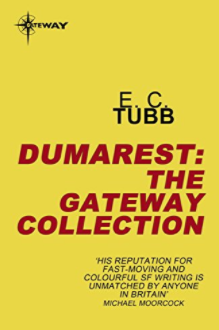These days the standard approach to analyzing of E.C. Tubb’s classic sci-fi series of adventure novels involves a heavy grounding in the classic sci-fi tabletop RPG, Traveller. Alas, younger me had not read the source material, and so my imagination lacked the fertile compost of this series in which a game of Traveller might have taken root. As such, investigating the ties that bind novel to game is an exercise best left to other analysts. Instead, reading these novels at this late stage of the game of life, the best I can do is report of them from a purely literary angle.
And from that angle, they are pretty damn good.

The series starts off with The Winds of Gath in which the titular hero, Earl Dumarest, yanked out of cold sleep by a bored ship’s tech. It’s the cliched approach to introducing a universe, one in which the character must warm up to his new situation in parallel with the reader.
It’s also an excellent way to establish two very important points right from the very first page. First, that the universe is a cold and uncaring place filled with cold and uncaring people who are happy to cheat you out of your last nickel for nothing more than their own amusement. It’s also a great way to establish the primary means of interstellar travel – a cold sleep that turns our primary protagonist from hot blooded hero to ice-cubed dunnage every time he planet-hops. It demonstrates that planet-hopping is a serious endeavor fraught with risk and expensive in terms of time and money. These two important points drive most of the action of the early stories in the series.
In brief, each novel begins with Dumarest on a planet looking for passage to the next planet. He becomes embroiled in the local political games, finds a woman worth the time and effort, and then charges headlong into danger to save her from her predicament and secure himself passage off-planet as a happy by-product.
In The Winds of Gath, Dumarest finds himself on a dead-end world where the only gainful employment available involves serving as a pack mule for hyperwealthy tourists. To his good fortune, one such set of tourists includes a planetary queen and her apparent choice for an heir using the jaunt as an excuse to avoid the political scene back home. In Derai, Dumarest once again finds himself on a hard-scrabble world plagued by a small coterie of global monopolists, and the object of the affections of the woman at the center of their high-stakes political games.
In each case, Dumarest wades into the fray armed only with his sharp wits, rough strength, and long years of experience dealing with the worst dregs of humanity, at both ends of the wealth bell curve. All he wants to do is get back to his home world of Terra, a planet so far distant from the lives of most people that it serves as little more than a vague myth. And in each case he becomes embroiled in the machinations of the only real source of information on Terra and its potential whereabouts. Unfortunately, said source consists of an emotionless psionic hivemind with no intention of releasing that information without exacting a heavy toll from Dumarest. It adds an element of cross-world threat that ties the stories together with a neat little bow, while leaving room for expansion and detail as the plot itself demands. It allows the series to consist of self-contained episodes underscored by consistent, season-long arc.
And now, with all of the plot elements out of the way, we at last come to reason this series had enough of a following to inspire one of the most popular sci-fi tabletop RPGs every produced – the writing. E.C. Tubb builds each episode bit by bit and brick by brick. He avoids long, drawn out descriptions, favoring a more economical means of pushing the story along in as few words as possible. Each story reads as a gritty fight against dark odds, with the laconic reminiscent of a Dashiell Hammet. The woman, the romance, the threats, and the fights, all forge ahead with deliberate speed, an implacable rising of the stakes that leads to an abrupt confrontation and a brief wrap-up to clarify any lingering threads of mystery. Then Tubb punches out with no need for a cliff-hanger or other gimmicky denouement. When the story needs to end, it ends.
It makes for an interesting take on the genre. A tale written at a time when plot was king and description took a back seat to economy of action. Always grim, but never without a beacon of hope shining through the pragmatic realism of Dumarest’s own philosophy, it is the best kind of throwback to the early days of hard sci-fi. The limits of science impinge on the story, and inform it, without holding the narrative hostage to ice cold equations. They are acknowledged and honored, without the sort of preening smart-boy showmanship that later become such a hallmark of hard sci-fi.
In short, they are well worth a read for anyone who wants to experience planetary intrigue centered on a hard bitten adventurer just looking to make one more score so he can keep searching for his own personal holy grail – Terra.
You can get the first six of thirty-three Dumarest novels bundled into one easy read over at Amazon.com:
Good post!
We have Don Wollheim to thank for nurturing Tubb’s career in the States. Ace Books published the first volume in the Dumarest series.
While Tubb can’t match Brackett, he’s close enough for government work. I’ve enjoyed all the Dumarest novels that I’ve read. To-the-point, fast-paced and hard-boiled.